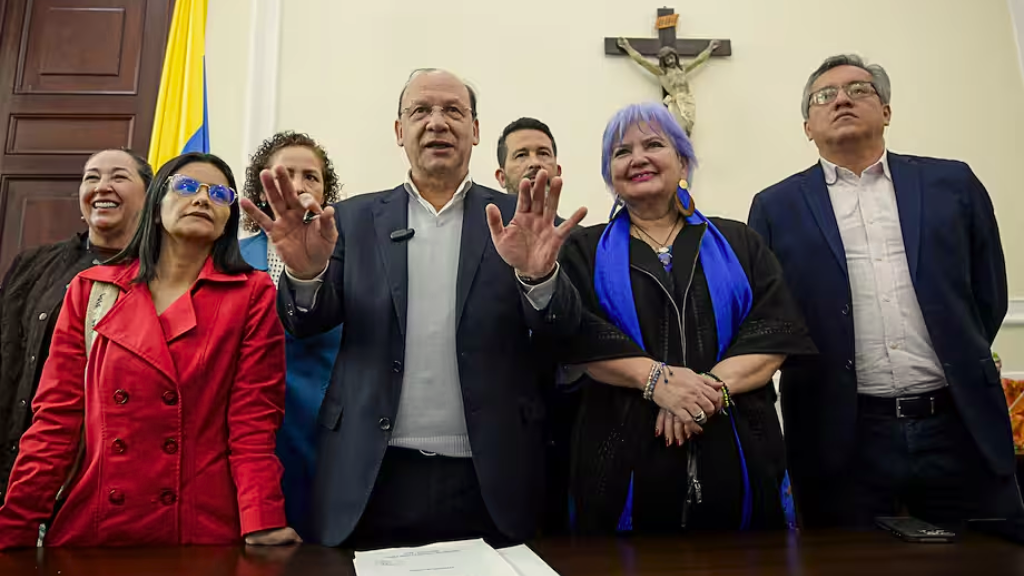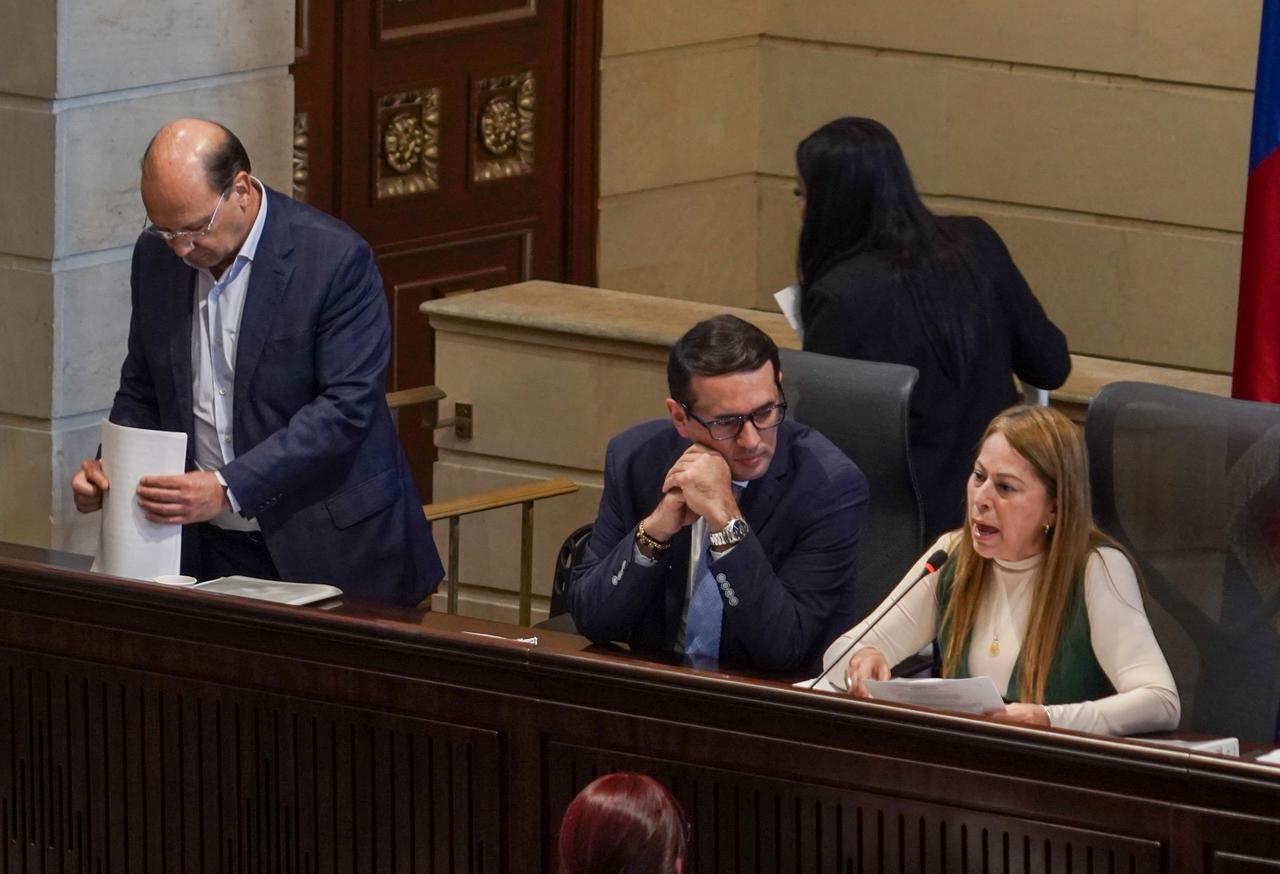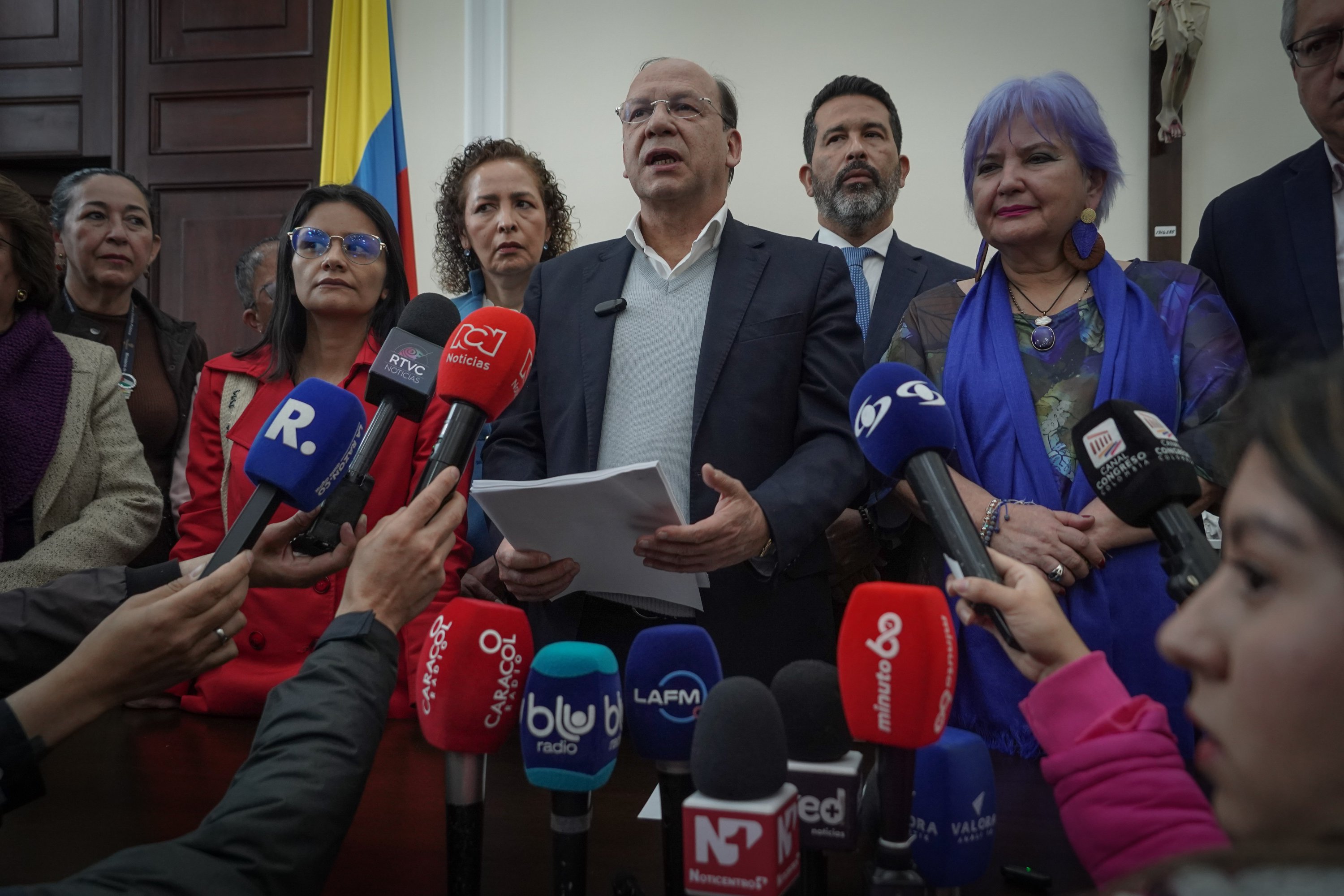Germán Ávila, Minister of Finance, speaks in an interview about the new tax reform: "We are open to talks with Congress to make adjustments."

Despite the criticism he has received, in an interview with EL TIEMPO, Finance Minister Germán Ávila defended the financing law, better known as tax reform, which will force some individuals and businesses to pay more taxes. He insists that the bill focuses on the middle-to-high and upper income brackets of the population and denies that spending is "out of control." He warns that if it doesn't pass, a similarly large cut would be necessary next year.
Will the price of liquor and tobacco go up? Yes, these would be subject to new taxes. The government believes their consumption should be discouraged to avoid adverse health effects.

Filing of the new Tax Reform. Photo: Ministry of Finance
The consumption of these types of products has a significant impact on the income of this population. While we expect monetary poverty to increase by 0.3 percentage points, thanks to the government's social programs, it would help reduce it by 2.3 percentage points, meaning it would not only be offset but would also be lowered at the same time.
And do you already have the necessary resources for these transfers? The project is linked to the 2026 budget and incorporates the new resources into all of the social programs the government has planned for the coming year.
Would the reform also raise the price of gasoline and diesel? Yes, there would be an increase as some existing exemptions are removed. However, the impact on a gallon of gasoline, which currently averages 16,000 pesos, would be small. It would rise by approximately 460 pesos, and diesel, another 250 pesos.
President Gustavo Petro stated a few days ago that "the poor don't use gasoline." What do you have to say about this? The share of fossil fuel use among the poorest segments of the population is less than 2 percent of their spending. Therefore, we believe its impact is very small.
Will the gradual increase in VAT from 10 to 19 percent on gasoline and diesel ultimately affect the entire economy, as various experts claim? There is a small impact on inflation, estimated at around 0.25 points for gasoline and 0.19 for diesel, but it is a very small marginal impact that will not have significant inflationary impacts.
Will there be VAT on management fees for horizontal properties? No, on the contrary. What we have established is an explicit exemption from management fees in residential complexes. This is false information.
And will tickets to concerts and sporting events be taxed? Only those valued at more than 500,000 pesos , and there are no tickets that cost that much, neither for sporting events such as soccer matches nor for movie or theater tickets.

Germán Ávila, Minister of Finance, in Congress. Photo: Mauricio Moreno. El Tiempo
Domestic tourists are not subject to any type of tax. What we've done is remove the VAT exemption that foreigners had when paying for their accommodation in the country. However, we believe it won't affect tourism, and it does generate significant income for us.
Information circulated on social media that the renovation will charge a 30 percent discount on apartment sales. What does the project say about this? That's not true. The goal is to tax inherited homes that exceed the value of affordable housing.
How much does a person have to earn to receive the rental rates raised under the reform? The marginal rate would begin to increase from 28 to 29 percent for a person with a gross monthly income of more than 10.2 million pesos.
So the President's tweet that it would only affect those earning 250 million isn't true? What the reform indicates is that people with monthly incomes exceeding 142 million pesos would see their marginal rate increase from 39 to 41 percent.
Will more people pay wealth tax? Yes, taxes were normally paid on assets close to 3.4 billion pesos, and we want to reduce this to around 2 billion pesos. It's important to keep in mind that the value of the home in which the person lives is deducted.
Aren't you afraid that capitals will leave the country? If those capital investments are to be withdrawn, they will incur an additional tax, which we have raised from 20 to 30 percent. Furthermore, we believe that the narrative that high-income sectors leave the country when they have to pay taxes is not entirely true, given that their potential for growth and profits in production must be developed within the country and through national production.
Does the reform affect the middle class? No, we believe the middle class will not really be affected by the reform, only the upper-middle and upper income brackets, which are those most affected by changes in income and wealth.
Are you confident that the reform will be approved in Congress? We have had an important exchange of views with the members of Congress. We have maintained a good relationship with them and thoroughly reviewed the budget. What we observed is a particular interest in increasing resources in almost all ministries, and obviously, if this project were not implemented and approved , a significant overall budget reduction would be required . This, the members of Congress are aware, is neither possible nor reasonable given the inflexibility of government spending, which generally amounts to more than 92 percent.
If the financing law were to be overturned, would there be a $26.3 billion cut in January? If the budget is approved as planned for 556.9 billion pesos and the financing law is not in place, a budget adjustment of this proportion will be necessary. However, we expect it to be analyzed, approved, and shared with Congress along with the law.

Finance Minister Germán Ávila submits the new tax reform. Photo: Mauricio Moreno. El Tiempo
We don't believe the cuts will be as large as you've expressed, but we are open to discussions with Congress to make possible general adjustments. Congress members know we need more resources to address programs they also consider important, but if adjustments are necessary, they would have to be agreed upon with Congress in the sectors that would be affected.
What will happen to the 12 billion that was cut in January of this year due to the underfunded budget of the previous year? A significant portion of these resources will be cut from the budget, and the rest of us have reorganized the budget to address the estimated shortfall in this year's budget.
Is he considering submitting a proposal to cut operating expenses? Experts and former finance ministers say he's "overwhelmed"... Operating expenses are neither out of control nor have they grown beyond the economy's growth expectations. In 2026, primary spending is almost the same as it was in 2020 at constant prices, meaning the path has been reasonable. Meanwhile, tax revenues have been growing steadily since 2025, and we believe we can maintain this trend in 2026 as growth has been consolidated.
Are you worried about the current cash flow shortage, which could affect you at the end of the year, when payment delays tend to occur the most? Our cash flow isn't that low; we're within normal limits. We have a budget that guarantees we'll close the year within normal limits.
The Autonomous Committee on Fiscal Rules (CARF) said the 2026 cut should be greater than 45.4 trillion. Isn't that enough, even with the tax cuts? We've seen the projections. However, we don't agree with their calculations. The financing law would provide the necessary resources for the government's operations next year.
Some experts believe the reform is impacting the cost of capital in the productive sector. Do you think the taxes imposed on sectors such as the mining, energy, and financial sectors will ultimately affect growth? We have sought exactly the opposite. We are sending signals of protection and encouragement to ensure economic growth. For example, we have not affected the productive sector. We are especially protecting the real sector, industry, and agriculture. One of the tools is the imposition of a tax on low-cost imports, which primarily affects small businesses, which face unfair competition from international platforms that import products into the country. We do believe that efforts should be made in the financial sector.
The government is pursuing an energy transition, but it's raising VAT on hybrid vehicles from 5 to 19 percent. Isn't that contradictory? It was observed that these did not make a sufficient contribution to reducing carbon emissions. Furthermore, the beneficiaries of the exemption were primarily from the upper-middle and upper classes. For this reason, an increase was made.

Minister Germán Ávila filed the new tax reform. Photo: Ministry of Finance
The tax on luxury goods, such as vehicles valued over $30,000, would be increased from 16 to 19 percent.
Are you concerned about the risks that the debt strategy you're implementing through TES operations could pose? What had been happening was that we were accustomed to a one-way market in which there was a certain expectation of comfort, but a very high cost of debt. We have been making transactions that open us up to other types of markets, but we are working on highly stable currencies with very low volatility, and we believe the strategy is yielding results.
By activating the fiscal rule's escape clause, they set a goal of reaching a 7.1 percent deficit this year. Will they meet it? We have that limit. However, we hope to have better news regarding the cost of debt and hopefully achieve better results regarding deficit levels.
eltiempo





